

Global Soccer - Embodying Arsenal, Dreaming of Barça. If all that is true, if Fàbregas is playing out his final season in England, then his attitude is to be commended.
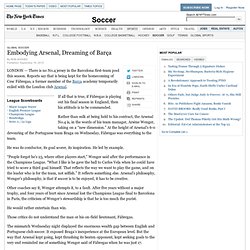
Rather than sulk at being held to his contract, the Arsenal No.4 is, in the words of his team manager, Arsène Wenger, taking on a “new dimension.” At the height of Arsenal’s 6-0 devouring of the Portuguese team Braga on Wednesday, Fàbregas was everything to the team. He was its conductor, its goal scorer, its inspiration. He led by example.
“People forget he’s 23, where other players start,” Wenger said after the performance in the Champions League. Other coaches say it, Wenger attempts it, to a fault. He would rather entertain than win. Those critics do not understand the man or his on-field lieutenant, Fàbregas. The mismatch Wednesday night displayed the enormous wealth gap between English and Portuguese club soccer. “Cesc,” he said, “is a killer. The new dimension to which Wenger referred this week was Fàbregas as master to young Jack Wilshere as pupil. Touch play. Historical Adam: Embracing the questions - Think Christian. Editor’s note: This is the first in an ongoing Think Christian series.
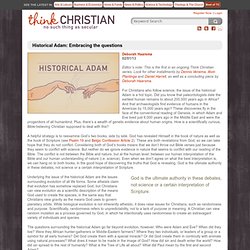
Look for other installments by Dennis Venema, Alvin Plantinga and Daniel Harrell, as well as a concluding piece by Deborah Haarsma. For Christians who follow science, the issue of the historical Adam is a hot topic. Did you know that paleontologists date the earliest human remains to about 200,000 years ago in Africa? And that archaeologists find evidence of humans in the Americas by 15,000 years ago? These discoveries fly in the face of the conventional reading of Genesis, in which Adam and Eve lived just 6,000 years ago in the Middle East and were the progenitors of all humankind. A helpful strategy is to reexamine God’s two books, side by side. On Phil Robertson's Suspension: So It Begins - Thinking Christian. My initial response to Phil Robertson’s suspension by A&E is best expressed by Theoden, at the beginning of the battle of Helm’s Deep, in The Two Towers, Lord of the Rings Trilogy.
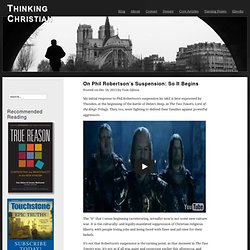
They, too, were fighting to defend their families against powerful aggressors. The “it” that I sense beginning (accelerating, actually) now is not some new culture war. It is the culturally- and legally-mandated suppression of Christian religious liberty, with people losing jobs and being faced with fines and jail time for their beliefs. It’s not that Robertson’s suspension is the turning point, as that moment in The Two Towers was. It’s not as if all was quiet and expectant earlier this afternoon, and now A&E has sounded the first bugle for the first assault across the bridge. There may never be one clearly identifiable turning point in our defense of biblical truth against the pressure exerted by advocates of unbridled sexual expression. P.J. O'Rourke, Ilya Shapiro, Trevor Burrus, and Gabriel Latner* Co-authored an Amici Curiae Brief, and It's as Awesome as You'd Think It'd Be.
Here’s a quick summary of the case at hand, Susan B.
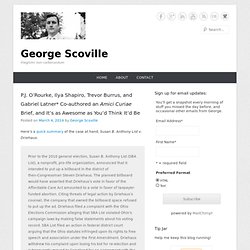
Anthony List v. Driehaus: Prior to the 2010 general election, Susan B. Anthony List (SBA List), a nonprofit, pro-life organization, announced that it intended to put up a billboard in the district of then-Congressman Steven Driehaus. The planned billboard would have asserted that Driehaus’s vote in favor of the Affordable Care Act amounted to a vote in favor of taxpayer-funded abortion.
You can read a full list of filings with the nation’s high court at SCOTUS blog, but wow did my former Cato Institute colleague Ilya Shapiro and H.L. On the merits, I of course agree with amici. On the role of “truthy” speech in our political discourse In modern times, “truthiness” — a “truth” asserted “from the gut” or because “it feels right,” without regard to evidence or logic — is also a key part of political discourse.
On why government has no place preempting truthy speech. Reading and thinking, one more time. I want to put together two recent posts because I think when you look at them in conjunction with each other they indicate a significant, and troubling, trend.
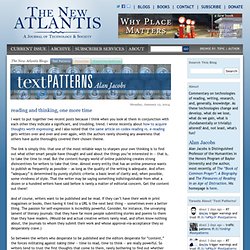
I wrote recently about how to acquire thoughts worth expressing; and I also noted that the same article on codex-reading vs. e-reading gets written over and over and over again, with the authors rarely showing any awareness that others have quite thoroughly covered their chosen theme. The link is simply this: that one of the most reliable ways to sharpen your own thinking is to find out what other smart people have thought and said about the things you’re interested in — that is, to take the time to read.
But the content-hungry world of online publishing creates strong disincentives for writers to take that time. Almost every entity that has an online presence wants to publish as frequently as possible — as long as the quality of the writing is adequate. And of course, writers want to be published and be read.